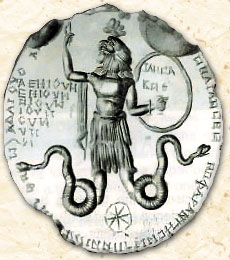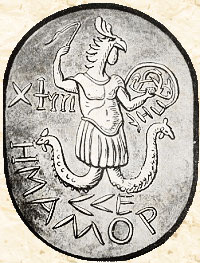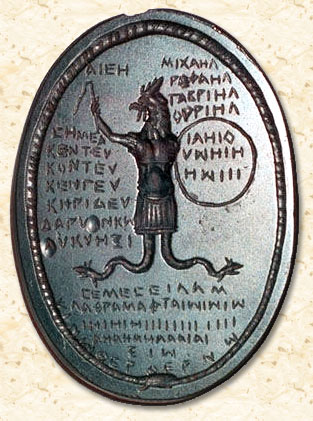Ну что, Странник, может, в Мазандеран махнем? К дэвицам?
Bestiary.us
энциклопедия вымышленных существБыстрый переход
- Средиземье Средизе́мье (англ. Middle-earth, буквально Среди́нная земля́, также существуют варианты перевода Среднеземье, Средьземелье) — одна из первых и самых известных фэнтези-вселенных. Оно является местом действия основных произведений Дж.Р.Р.Толкина, а также «вольных продолжений» других авторов.
- Бестиарий Сапковского Бестиарий книг Анджея Сапковского о ведьмаке, волшебные существа и расы мира Геральта.
- Игра престолов Сага о мире Семи Королевств. О мире суровых земель вечного холода и радостных земель вечного лета. Мире лордов и героев, воинов и магов, чернокнижников и убийц — всех, кого свела воедино Судьба во исполнение древнего пророчества. О мире опасных приключений, великих деяний и тончайших политических интриг.
Абраксас
Абраксас — в представлениях гностиков I-III веков, космологическое существо с головой петуха, телом человека и змеями вместо ног
Абраксас — в представлениях гностиков I-III веков, космологическое существо с головой петуха, телом человека и змеями вместо ног
Абраксас — в представлениях гностиков I-III веков, космологическое существо с головой петуха, телом человека и змеями вместо ног
Абраксас — в представлениях гностиков I-III веков, космологическое существо с головой петуха, телом человека и змеями вместо ног
Абраксас — в представлениях гностиков I-III веков, космологическое существо с головой петуха, телом человека и змеями вместо ног
Abracax —
Abrasax —
Abraxas —
Άβράξας —
Άβρασάξ —
Абрасакс —
"Согласно доктрине василидиан (одной из гностических сект — последователей Василида, Сирия, II век), Абраксас — верховный глава небес и эонов, как бы совмещающий в своём лице их полноту. В системе Василида сумма числовых значений входящих в слово "Абраксас" семи греческих букв (1 + + 2 + 100 + 1 + 60 + 1 + 200) даёт 365 — число дней в году ("целокупность мирового времени"), а также число небес ("целокупность мирового пространства") и соответствующих небесам эонов ("целокупность духовного мира"). "Космический" характер семёрки как общего числа букв подчеркивает придававшийся имени Абраксаса смысл некоего исчерпания моментов бытия, окончательной суммарности" (2).
Отцы церкви боролись с ересью гневными отповедями и едкими насмешками. Святой Епифаний язвительно замечал, что ересиархи пытаются "действовать на воображение неопытных ужасными именованиями варварским составлением сих наименований", — он имел в виду и звание Абраксаса.
Имя Абраксаса и его иконографический образ (существо с головой петуха, телом человека и змеями вместо ног; в руках — меч и щит), известный по изображениям на геммах-амулетах, имели распространение и за пределами христианского гностицизма, в культово-магическом обиходе позднеантичного синкретического язычества (2).
Во II веке христианская церковь победила ереси, но в средние века Абраксас снова стал довольно известен: его изображение как талисман было принято алхимиками, которые носили на груди медальоны с человеко-петухозмеем.
"Afterwards broke out the heretic Basilides. He affirms that there is a supreme Deity, by name Abraxas, by whom was created Mind, which in Greek he calls Nous; that thence sprang the Word; that of Him issued Providence, Virtue, and Wisdom; that out of these subsequently were made Principalities, powers, and Angels; that there ensued infinite issues and processions of angels; that by these angels 365 heavens were formed, and the world, in honor of Abraxas, whose name, if computed, has in itself this number. Now, among the last of the angels, those who made this world, he places the God of the Jews latest, that is, the God of the Law and of the Prophets, whom he denies to be a God, but affirms to be an angel. To him, he says, was allotted the seed of Abraham, and accordingly he it was who transferred the sons of Israel from the land of Egypt into the land of Canaan; affirming him to be turbulent above the other angels, and accordingly given to the frequent arousing of seditions and wars, yes, and the shedding of human blood. Christ, moreover, he affirms to have been sent, not by this maker of the world, but by the above-named Abraxas; and to have come in a phantasm, and been destitute of the substance of flesh: that it was not He who suffered among the Jews, but that Simon was crucified in His stead: whence, again, there must be no believing on him who was crucified, lest one confess to having believed on Simon. Martyrdoms, he says, are not to be endured. The resurrection of the flesh he strenuously impugns, affirming that salvation has not been promised to bodies."
Tertullian
"Abraxas represented the 365 Aeons or emanations from the First Cause, and as a Pantheus, i.e. All-God, he appears on the amulets with the head of a cock (Phoebus) or of a lion (Ra or Mithras), the body of a man, and his legs are serpents which terminate in scorpions, types of the Agathodaimon. In his right hand he grasps a club, or a flail, and in his left is a round or oval shield."
E. A. Wallis Budge
Abrasax is invoked in the The Gnostic Mass of the Ecclesia Gnostica Catholica:
"IO IO IO IAO SABAO KURIE ABRASAX KURIE MEITHRAS KURIE PHALLE. IO PAN, IO PAN PAN IO ISCHUROS, IO ATHANATOS IO ABROTOS IO IAO. KAIRE PHALLE KAIRE PAMPHAGE KAIRE PANGENETOR. HAGIOS, HAGIOS, HAGIOS IAO."
Aleister Crowley
В литературе XX века ("Семь проповедей к мёртвым" К.Г.Юнга, "Демиан" Г.Гессе) к символу Абраксаса обращались для выражения идеи высшего единства добрых и злых потенций человеческой души.
"Abraxas speaketh that hallowed and accursed word which is life and death at the same time. Abraxas begetteth truth and lying, good and evil, light and darkness in the same word and in the same act. Wherefore is Abraxas terrible."
Carl Jung, "The Seven Sermons to the Dead" (Карл Юнг, "Семь проповедей к мёртвым")
В рассказе Томаса Мура "Утопия", одноименный рассказу остров однажды упоминается под названием "Абраксас".
Упоминание бога Абраксаса встречается в следующем отрывке рассказа Германа Гессе "Демиан":
"The bird is struggling out of the egg. The egg is the world. Whoever wants to be born must first destroy a world. The bird is flying to God. The name of the God is called Abraxas."
Hermann Hesse, "Demian" (Герман Гессе, "Демиан")
Abraxas is this way connected to the Sun saturn split, where the sun/divine cosmic egg represents the Holy father and Abraxas breaking out of the egg shell denotes saturn, rebellion against the Godhood.
The Abraxas passage in Demian is later adapted in the anime version of Chiho Saito's comic "Revolutionary Girl Utena" in a verse that is recited by Ohtori Academy Student Council members before meetings:
"If the chick cannot break the shell if its egg, it will die without being born. We are the chick; the world is our egg. If we cannot break the world's shell, we will die without being born. Smash the world's shell - for the revolution of the world."
The name of the song that typically plays during this sequence is "Legend: That God's Name is Abraxas".
In Hugo Pratt's story "Favola di Venezia — Sirat Al-Bunduqiyyah" ("Fable of Venice"), Corto Maltese encounters several Abraxas in Venice.
Abraxas (played by Walter Phelan) appears as a demon in the second season premier of the hit tv series "Charmed"; the episode is entitled "Witch Trials."
В книге "Гарри Поттер и принц-полукровка" упоминается, что дед Драго Малфоя также носит имя Абраксас.
Abraxas is a fictional cosmic entity from Marvel Comics that was introduced in "Galactus: The Devourer".
Онлайн источникиАнлайн крыніцыŹródła internetoweОнлайн джерелаOnline sources
Статус статьиСтатус артыкулаStatus artykułuСтатус статтіArticle status:
Заглушка (пустая страница, созданная чтобы застолбить неопределенно запланированную статью, либо чтобы прикрыть ведущую из другой статьи ссылку)
Подготовка статьиПадрыхтоўка артыкулаPrzygotowanie artykułuПідготовка статтіArticle by:
Адрес статьи в интернетеАдрас артыкулу ў інтэрнэцеAdres artykułu w internecieАдрес статті в інтернетіURL of article: //bestiary.us/abraxas

Культурно-географическая классификация существ:
Культурна-геаграфічная класіфікацыя істот:
Kulturalno-geograficzna klasyfikacja istot:
Культурно-географічна класифікація істот:
Cultural and geographical classification of creatures:
Псевдо-биологическая классификация существ:
Псеўда-біялагічная класіфікацыя істот:
Pseudo-biologiczna klasyfikacja istot:
Псевдо-біологічна класифікація істот:
Pseudo-biological classification of creatures:
Физиологическая классификация:
Фізіялагічная класіфікацыя:
Fizjologiczna klasyfikacja:
Фізіологічна класифікація:
Physiological classification:
Форумы:
Форумы:
Fora:
Форуми:
Forums:
Еще? Еще!
Хут — в фольклоре северной Беларуси домовой дух-обогатитель, близкий огненному змею, домовому цмоку, латышскому путису и литовскому айтварасу
Нехебкау — древнеегипетский бог времени и плодородия, змееобразный податель пищи
Рененутет — древнеегипетская змееголовая богиня собранного урожая
Апедемак — львиноголовый бог воинской доблести и плодородия, покровитель царской власти и глава древнекушитского пантеона
Уто — в египетской мифологии богиня-кобра, покровительница города Буто и всей дельты Нила, воплощение Нижнего Египта и власти фараона
Кебхут — в древнеегипетской мифологии богиня бальзамирования и чистой прохладной воды
Аш — один из древнейших богов египетской мифологии, сокологоловый покровитель Ливийской пустыни
Венет — зайцеобразная богиня-покровительница 15-го нома Верхнего Египта
Навагунджара — в индуизме мифическое животное, составленное из девяти разных существ, воплощение бога Вишну
Куйгорож — в мордовской (мокшанской и эрзянской) и чувашской мифологии фантастическое существо, приносящее в дом сокровища
Порескоро — по поверьям цыган демоническая птица с торчащими из туловища кошачьими и собачьими головами и змеиным хвостом
Яюй — китайский дракон, живущий в водах Жошуй
Демон — воплощение обобщенного представления о неопределенной потусторонней силе, злой или благостной
Вужалка — в белорусском фольклоре девушка-змея, дочь змеиного царя





Comments
Abraxas(Therion, альбом "Lemuria")
 .
. .
.
Eros and Thanatos are branches on the same old tree
Rooted in the soil of shadow and light
If God was separated from the dark twin, the Devil,
Could he ever know the soul of Mankind?
We want a new god called Abraxas!
Enter the Pleroma and see that nothiness is all
And you must destroy a wotld to be born
Alpha and Omega are the beginning and the end
United in the shape of Abraxas
Darkness and the light
Sermones ad Mortous, empty fullness
Abraxas, your words is a riddle to be solved
You bear the mark of Cain
And you are fighting like a bird
Free you from the egg is all the world
The Sermon to the Dead
A gospel to another life
Hear the wirds of Cain? the sinner and the saint
The grave is a flower
And you are dying to be born
Baptized by fire and you will slough your skin
The sign of Abraxas
The circle of the solar year
Deep in the winter you'll see the sun be born
Правда на иллюстрации почему-то был изображён львиноголовый человек… А вообще, это чудище вполне способно стать интернет-кумиром после Ктулху
А вот загадка почти для клуба "Что? Где? Когда?" — http://orgius.ru/txt/skulptor.html, лично я до сих пор ломаю голову:"Причём тут Абраксас?!" Кто сообразит — просветите
http://kardiologn.livejournal.com/47348.html
Экстранаучная классификация
- статус — божества
- домен — настоящего
- тип — боги
- класс — абстрактные
...
- персона — Абраксас
Физиология
Человек, Петух, Змея
Строение (композиция)
- Чудоглавость, Змееногость
Культурно-географическая
Христианский фольклор, Алхимическая традиция
Почему статус статьи до сих пор заглушка? По моему это готовая полноценная статья.
Статья последний раз редактировалась до того, как на сайте были введены статусы, и всем старым статьям был присвоен такой статус. Да и статья явно не доделана, часть текста даже не переведена.
Отправить комментарий